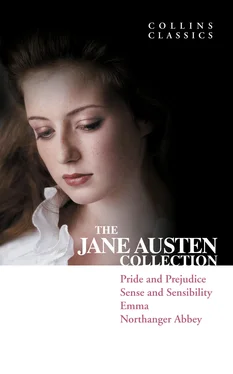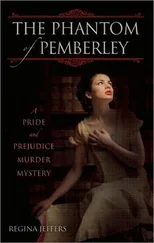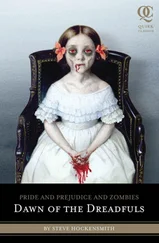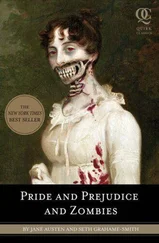‘Oh! my dear Mr Bennet,’ as she entered the room, ‘we have had a most delightful evening, a most excellent ball. I wish you had been there. Jane was so admired, nothing could be like it. Every body said how well she looked; and Mr Bingley thought her quite beautiful, and danced with her twice. Only think of that , my dear; he actually danced with her twice! and she was the only creature in the room that he asked a second time. First of all, he asked Miss Lucas. I was so vexed to see him stand up with her; but, however, he did not admire her at all; indeed, nobody can, you know; and he seemed quite struck with Jane as she was going down the dance. So he inquired who she was, and got introduced, and asked her for the two next. Then the two third he danced with Miss King, and the two fourth with Maria Lucas, and the two fifth with Jane again, and the two sixth with Lizzy, and the Boulanger –’
‘If he had had any compassion for me ,’ cried her husband impatiently, ‘he would not have danced half so much! For God’s sake, say no more of his partners. Oh! that he had sprained his ancle in the first dance!’
‘Oh! my dear,’ continued Mrs Bennet, ‘I am quite delighted with him. He is so excessively handsome! and his sisters are charming women. I never in my life saw any thing more elegant than their dresses. I dare say the lace upon Mrs Hurst’s gown –’
Here she was interrupted again. Mr Bennet protested against any description of finery. She was therefore obliged to seek another branch of the subject, and related, with much bitterness of spirit and some exaggeration, the shocking rudeness of Mr Darcy.
‘But I can assure you,’ she added, ‘that Lizzy does not lose much by not suiting his fancy; for he is a most disagreeable, horrid man, not at all worth pleasing. So high and so conceited that there was no enduring him! He walked here, and he walked there, fancying himself so very great! Not handsome enough to dance with! I wish you had been there, my dear, to have given him one of your set downs. I quite detest the man.’
When Jane and Elizabeth were alone, the former, who had been cautious in her praise of Mr Bingley before, expressed to her sister how very much she admired him.
‘He is just what a young man ought to be,’ said she, ‘sensible, good humoured, lively; and I never saw such happy manners! – so much ease, with such perfect good breeding!’
‘He is also handsome,’ replied Elizabeth, ‘which a young man ought likewise to be, if he possibly can. His character is thereby complete.’
‘I was very much flattered by his asking me to dance a second time. I did not expect such a compliment.’
‘Did not you? I did for you. But that is one great difference between us. Compliments always take you by surprize, and me never. What could be more natural than his asking you again? He could not help seeing that you were about five times as pretty as every other woman in the room. No thanks to his gallantry for that. Well, he certainly is very agreeable, and I give you leave to like him. You have liked many a stupider person.’
‘Dear Lizzy!’
‘Oh! you are a great deal too apt, you know, to like people in general. You never see a fault in any body. All the world are good and agreeable in your eyes. I never heard you speak ill of a human being in my life.’
‘I would wish not to be hasty in censuring any one; but I always speak what I think.’
‘I know you do; and it is that which makes the wonder. With your good sense, to be honestly blind to the follies and nonsense of others! Affectation of candour is common enough; – one meets it every where. But to be candid without ostentation or design – to take the good of every body’s character and make it still better, and say nothing of the bad – belongs to you alone. And so, you like this man’s sisters too, do you? Their manners are not equal to his.’
‘Certainly not; at first. But they are very pleasing women when you converse with them. Miss Bingley is to live with her brother and keep his house; and I am much mistaken if we shall not find a very charming neighbour in her.’
Elizabeth listened in silence, but was not convinced. Their behaviour at the assembly had not been calculated to please in general; and with more quickness of observation and less pliancy of temper than her sister, and with a judgment, too, unassailed by any attention to herself, she was very little disposed to approve them. They were in fact very fine ladies; not deficient in good humour when they were pleased, nor in the power of being agreeable where they chose it; but proud and conceited. They were rather handsome, had been educated in one of the first private seminaries in town, had a fortune of twenty thousand pounds, were in the habit of spending more than they ought, and of associating with people of rank, and were therefore in every respect entitled to think well of themselves, and meanly of others. They were of a respectable family in the north of England; a circumstance more deeply impressed on their memories than that their brother’s fortune and their own had been acquired by trade.
Mr Bingley inherited property to the amount of nearly an hundred thousand pounds from his father, who had intended to purchase an estate, but did not live to do it. Mr Bingley intended it likewise, and sometimes made choice of his county; but as he was now provided with a good house and the liberty of a manor, it was doubtful to many of those who best knew the easiness of his temper, whether he might not spend the remainder of his days at Netherfield, and leave the next generation to purchase.
His sisters were very anxious for his having an estate of his own; but, though he was now established only as a tenant, Miss Bingley was by no means unwilling to preside at his table; nor was Mrs Hurst, who had married a man of more fashion than fortune, less disposed to consider his house as her home when it suited her. Mr Bingley had not been of age two years, when he was tempted by an accidental recommendation to look at Netherfield House. He did look at it and into it for half an hour, was pleased with the situation and the principal rooms, satisfied with what the owner said in its praise, and took it immediately.
Between him and Darcy there was a very steady friendship, in spite of a great opposition of character. Bingley was endeared to Darcy by the easiness, openness, ductility of his temper, though no disposition could offer a greater contrast to his own, and though with his own he never appeared dissatisfied. On the strength of Darcy’s regard Bingley had the firmest reliance, and of his judgment the highest opinion. In understanding, Darcy was the superior. Bingley was by no means deficient, but Darcy was clever. He was at the same time haughty, reserved, and fastidious, and his manners, though well bred, were not inviting. In that respect his friend had greatly the advantage. Bingley was sure of being liked wherever he appeared; Darcy was continually giving offence.
The manner in which they spoke of the Meryton assembly was sufficiently characteristic. Bingley had never met with pleasanter people or prettier girls in his life; every body had been most kind and attentive to him, there had been no formality, no stiffness, he had soon felt acquainted with all the room; and as to Miss Bennet, he could not conceive an angel more beautiful. Darcy, on the contrary, had seen a collection of people in whom there was little beauty and no fashion, for none of whom he had felt the smallest interest, and from none received either attention or pleasure. Miss Bennet he acknowledged to be pretty, but she smiled too much.
Mrs Hurst and her sister allowed it to be so – but still they admired her and liked her, and pronounced her to be a sweet girl, and one whom they should not object to know more of. Miss Bennet was therefore established as a sweet girl, and their brother felt authorized by such commendation to think of her as he chuse.
Читать дальше

![Джейн Остин - Sense and Sensibility [С англо-русским словарем]](/books/26612/dzhejn-ostin-sense-and-sensibility-s-anglo-thumb.webp)









![John Bruce - The Lettsomian Lectures on Diseases and Disorders of the Heart and Arteries in Middle and Advanced Life [1900-1901]](/books/749387/john-bruce-the-lettsomian-lectures-on-diseases-and-disorders-of-the-heart-and-arteries-in-middle-and-advanced-life-1900-1901-thumb.webp)
